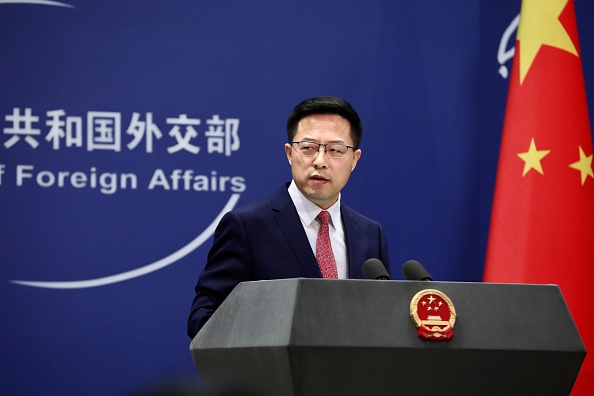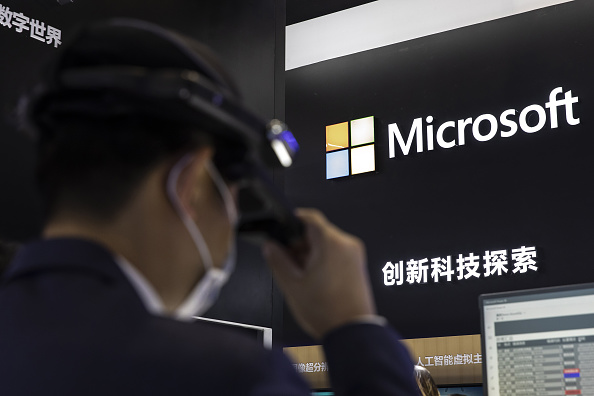
 Bilateral Interests
Bilateral InterestsPresident Joe Biden has signaled that his administration is weighing whether to roll back some of former President Donald Trump's tariffs on Chinese goods. As Americans continue to feel the sting of soaring inflation, eliminating or at least reducing additional tariffs on Chinese goods could help lower elevated inflation and stabilize inflation expectations. As such, Biden has said he could drop some of the tariffs imposed against Chinese imports, noting that the White House is reviewing the penalties and could opt to "remove them altogether."
Chinese Foreign Ministry spokesperson Zhao Lijian argued that the tariffs are not in the interest of China, the U.S., or the global economy. And in an interview with Forbes, Qin Gang, the Chinese Ambassador to the U.S., said that "the United States should stop politicizing our business cooperation and stop using trade as a tool, so that we could provide more stability and predictability to investors."
Claiming that the trade war has cost America more than 240,000 jobs, Qin refuted the notion that China is retreating inwards and said its "door will be kept wider and wider to the rest of the world." He also stated that he believes China has fulfilled all its phase one trade deal obligations with time deadlines.
Qin also recently spoke at a gala event hosted by the Committee of 100 focused on the "state of Chinese Americans" as well as "the future of the U.S. China relationship," where he deplored the U.S.' sinophobic attitude towards China, rejecting the notion that China is not only the U.S.' "most serious competitor" but also its "national security threat No. 1."
Meanwhile, with Secretary of State Anthony Blinken recovering from COVID, all eyes are on the reveal of the United States' U.S.-China policy, which will likely be discussed at next week's U.S.-ASEAN summit in Washington, as well as the Quad summit later this month in Tokyo, where President Joe Biden will meet with counterparts from Australia, India and Japan.
Read more in "China Policy Framework Taking Shape," by Zhang Monan, a Senior Fellow at the China Center for International Economic Exchanges.
 Changing the Game?
Changing the Game?The United States has insisted that nothing has changed in its stance toward Taiwan after Beijing was angered by an updated fact sheet that used less explicit language to reject the island's independence. The State Department said the United States still only recognized Beijing as China's government and was simply polishing off an online fact sheet which had not been altered in years.
"There's been no change in our policy. All we have done is update a fact sheet, and that's something that we routinely do with our relationships around the world," State Department spokesman Ned Price told reporters.
White House Indo-Pacific coordinator Kurt Campbell separately said during a think tank event the same day, "I can be very direct. Our policy has not changed and remains consistent".
Taiwan's leading newspaper called changes to the U.S. Department of State's fact sheet on Taiwan an indication of "a significant warming" in relations between Taiwan and the U.S., as Beijing denounced it as "political manipulation."
In Beijing, Zhao Lijian said that President Joe Biden needed to take "real actions" to show he opposes Taiwan's independence. "The US' latest modification of the fact sheet is a trick to obscure and write off the One China principle," he told reporters. "Such political manipulation of the Taiwan question and the attempt to change the status quo across the Taiwan Strait will hurt the U.S. itself."
In the meantime, the U.S. Navy sent a ship through the Strait of Taiwan after China practiced military drills, sending 18 warplanes into Taiwan's air defense identification zone. The Chinese People's Liberation Army accused the U.S. of showing support for "Taiwan independence secessionist forces," as analysts worried that these tit-for-tat measures are part of the new normal.
Read more in "How to Avoid War Over Taiwan," by Zhang Tuosheng, an Academic Committee Member at the Center for International Security and Strategy at Tsinghua University.
 Tech Battles
Tech BattlesIn an ongoing campaign to replace imported technology with local alternatives, Beijing this week ordered central government agencies and state-backed corporations to exchange foreign-branded computers for local PCs that run on domestically developed software within the next two years. Earlier this month, staff in some companies were asked to turn in their foreign computers upon returning from their week-long May holiday, people familiar with the matter said. It's estimated that these exercises will eventually replace over 50 million PCs in the central government alone, marking one of China's most aggressive efforts to eliminate overseas technology from its internal systems since the push to do so began a decade ago.
With the precedent of similar mandates from the past few years, analysts are unclear if the new order will be carried out to scale. In 2020, the Chinese government announced it would replace all Windows-run PCs with the domestically created Linux bistro by 2022, but it's unclear if that's been accomplished.
Similarly, the White House, Congress, and federal agencies began ordering certain Chinese-made equipment be replaced from telecommunications and security networks in the U.S., citing national security threats, now three years ago. But due to delays, deferrals, and lack of funding, these orders have been mostly unaddressed and Chinese technology can still be found throughout the U.S., including the Department of Defense facilities. The Trump administration also attempted to ban popular social platforms from Chinese companies, such as Tik Tok and WeChat.
This week, however, the Biden administration drafted an executive order to respond more aggressively to the threats allegedly posed by Chinese companies that obtain the data of U.S. citizens. The proposal would give the Department of Justice vast powers to stop foreign adversaries from accessing Americans' personal data.
Prepared by China-US Focus editorial teams in Hong Kong and New York, this weekly newsletter offers you snap shots of latest trends and developments emerging from China every week, while adding a dose of historical perspective.
- 2022-05-06 Vying for Mutual Benefit
- 2022-04-29 Seeking Relief
- 2022-04-22 Tipping Point
- 2022-04-15 “Persistence is Victory”
- 2022-04-08 No Divorce
- 2022-04-01 Auditing Accountability
- 2022-03-25 Playing Policy
- 2022-03-18 One Hand Cannot Clap
- 2022-03-11 Political Forecast
- 2022-03-04 Competitive Advantage
- 2022-02-25 A Sovereign Tightrope
- 2022-02-18 Strategic Disengagement
- 2022-02-11 In the Thick of It
- 2022-02-04 Year of the Tiger
- 2022-01-28 Zero-Sum
- 2022-01-21 An Uncertain Future
- 2022-01-14 Digital Advances
- 2022-01-07 The Dawn of a New Political Year
- 2021-12-17 Clamp Down
